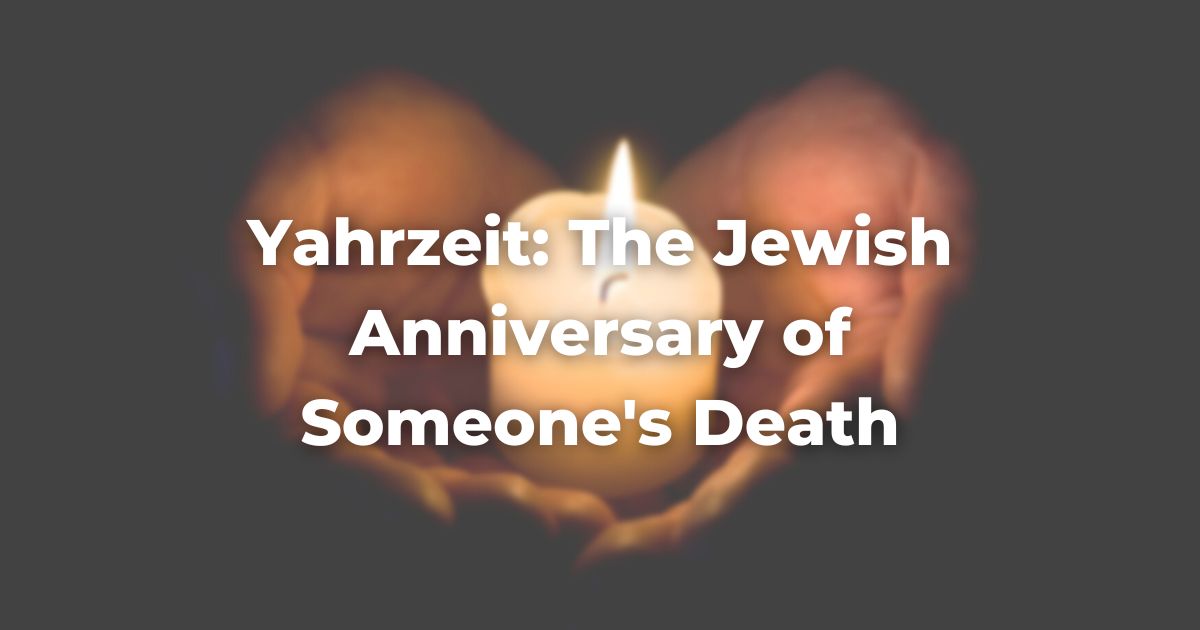The gradual lessening of intensity of mourning continues after the initial periods of mourning with the annual observance of the anniversary of a loved one’s death.
That day, popularly known among Ashkenazic Jews as the individual’s yahrzeit (also spelled yahrtzeit), should be a day given over to remembering and honoring a deceased individual for whom one once sat shivah and with whose loss one is learning to live.
Giving gifts of charity, doing good deeds, or studying selections of MishnahA collection of rabbinic teachings edited in Israel around 225 CE. Organized in six sedaraim by subject matter and dealing with both ritual and civil law. Both the Jerusalem and Babylonian Talmud are expansive discussions of the Mishnah. Read more in memory of a loved one are appropriate ways of observing the yahrtzeit.
The yahrtzeit of an individual falls exactly one year after the date of death according to the Jewish calendar.
This is different from the calculation of shivah and sh’loshim, which are calculated from the time of burial (gloss of the Rema to Shulchan Arukh, Yoreh Deah 402:12, cf. SA Orach Chayim 568:8).
If death occurs during the month of Adar in a non-leap year (in a year in which there is only one Adar), there are different opinions about whether the yahrtzeit should be observed in the first Adar or both the first and second Adar; the prevalent custom is for the yahrtzeit to observed during the first month of Adar in a leap year.
If, however, death occurs during one of the months of Adar in a leap year, then the yahrtzeit is observed in the same Adar in which the death occurred in leap years. In a non-leap year, of course, all Adar yahrzeits are observed in the single month of Adar.
There are two Jewish months, Kisleiv and Tevet, in which Rosh Ḥodesh is sometimes observed for one day and sometimes for two.
(When it is observed for two days, the first day is actually the thirtieth day of the preceding month.)
The custom is to fix the yahrtzeit in terms of the situation that pertains in the first year following death.
If death occurs on the first day of Rosh Ḥodesh in a year when the Rosh Ḥodesh of either month has two days (i.e., on the thirtieth day of the previous month), and then the first anniversary of the death falls in a year in which that day does not exist (because the preceding month only has twenty-nine days, and Rosh Ḥodesh, therefore, is only observed for one day, the first day of the subsequent month), then the yahrtzeit is fixed on the twenty-ninth day of the previous month.
(This way, the yahrtzeit at least falls in the same month as the death occurred, if not precisely on the same day.)
If, however, the first year after death has a Rosh ḥodesh that is observed for two days (and so the actual day the decedent died exists in the first year following death), then yahrzeit is fixed on Rosh ḥodesh, either on the only day in years when there is only one single day of observance, or on the first of the two days if there are two days.
If one forgets to observe a yahrzeit, it should be observed as soon as one remembers it in the same fashion one would have observed it on the correct date.
If one does not know the date of a relative’s death, one should choose a date that is close to the probable date of death, and the yahrtzeit should be observed on that date every year.
If even an approximate date cannot be reasonably chosen, then any day at all may be selected, either at random or because it has some family significance, and that day should be permanently observed as that person’s yahrtzeit.
The El Malei Raḥamim prayer is recited on a Torah-reading day before or on the yahrtzeit.
It is customary to light a twenty-four-hour candle on the evening of the yahrtzeit and to let it burn for the entire day. There is no special prayer or blessing to be recited upon lighting the yahrzeit candle.
Where lit candles are not permitted, as in a hospital or nursing home, an electric memorial lamp may be used in place of the candle.
One should try to attend all three daily services on the day of the yahrtzeit and recite the Kaddish at these services.
Those observing a yahrzeit are traditionally given precedence to lead the prayer service if they are capable of doing so.
Adapted with permission from The Observant Life.
Authors
-

-

The Observant Life: The Wisdom of Conservative Judaism for Contemporary Jews distills a century of thoughtful inquiry into the most profound of all Jewish questions: how to suffuse life with timeless values, how to remain loyal to the covenant that binds the Jewish people and the God of Israel, and how to embrace the law while retaining an abiding sense of fidelity to one’s own moral path in life.
Written in a multiplicity of voices inspired by a common vision, the authors of The Observant Life explain what it means in the ultimate sense to live a Jewish life, and to live it honestly, morally, and purposefully. The work is a comprehensive guide to life in the 21st Century. Chapters on Jewish rituals including prayer, holiday, life cycle events and Jewish ethics such as citizenship, slander, taxes, wills, the courts, the work place and so much more.
View all posts




